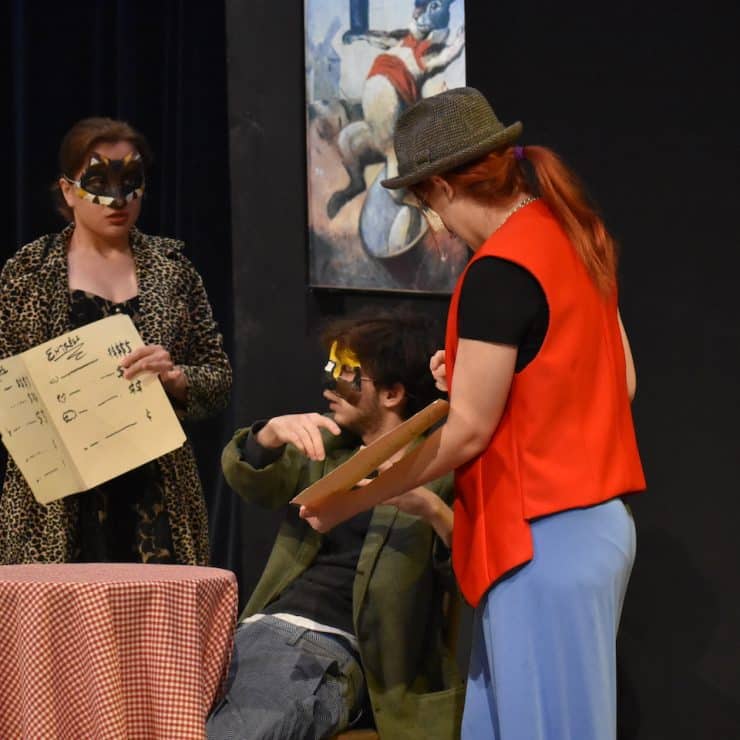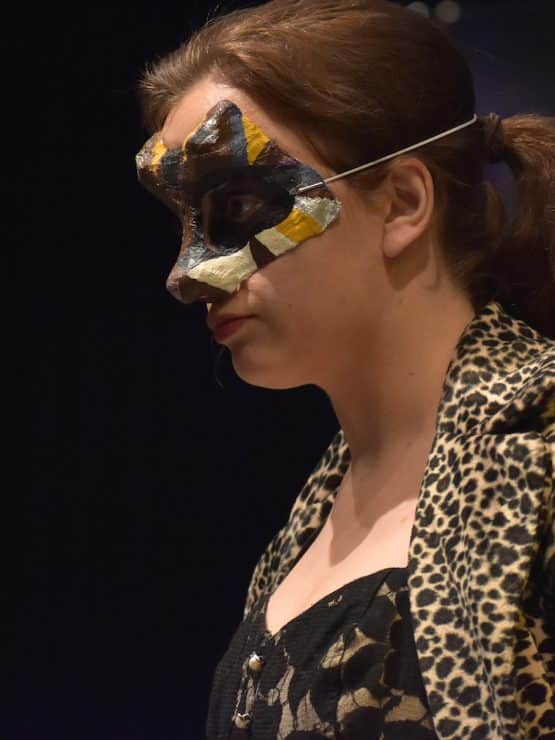
Theatre
Theater is a place for entertainment and engagement, either as audience members or as performers or backstage wizards! Our classes and productions are open to all members of the MU community, no matter what your major. Many majors can benefit from the addition of a minor in Theatre, especially if your field of study includes making presentations. We’re also a home for self-motivated individuals who are interested in creating their own work— we’ve produced original plays, student-directed projects, even movement pieces with a theatrical spin. We’re also aware and supportive of the theater community in Fayetteville and the surrounding area. Students (and faculty) have appeared in productions at Cape Fear Regional Theatre, the Gilbert Theater, and Sweet Tea Shakespeare. We encourage students to attend and support these organizations as well as professional and community theaters within driving distance in Sanford and the Raleigh-Durham-Chapel Hill region.
Common Career Paths
Some of the top jobs for those with a Theatre educational background include director, choreographer, actor, dancer, writer, broadcaster, casting manager, and much more.
Common Salary Ranges for Graduates
As mentioned above, there’s a long list of career opportunities for those with Theatre educational backgrounds. But, the U.S. Bureau of Labor Statistics reports the average annual salary for the following positions (which may require additional education) in North Carolina in 2021:
- Actor, producer, and director: $95,360
- Choreographer: $49,630
- Dancer and choreographer: $50,280
- Writer and author: $81,120
- Broadcast announcer: $56,110
Average Tuition Cost
The average cost for an incoming residential freshman to attend MU is less than $18,000 – similar to the cost of attending one of the big-box public schools, but with the enhanced value of a highly-regarded private school with a 12:1 student-to-faculty ratio.
While tuition varies, depending on a student’s financial aid package, it’s important to know that the average financial award for an incoming residential freshman at MU is more than $34,000.
Financial Aid & Scholarships
More than 97% of MU students receive some form of financial aid, with the University offering more than $24 million annually to students for scholarships. If a student is active military, family of active military, or a veteran, they may also qualify for MU’s military education benefits.
Interested in Methodist University’s Theatre minor?
If you have questions, reach out to Dr. Evan Bridenstine using the contact info at the bottom of the page. If you’re ready to apply today, visit the link below!
Frequently Asked Questions
While we do not offer a technical theatre degree specifically, Methodist University’s minor in Theatre will teach and prepare students the technical aspects of a theatre production.
Some of the top jobs for those with a Theatre educational background include director, choreographer, actor, dancer, writer, broadcaster, casting manager, and much more.
Minor Requirements
The Theatre minor consists of 15 credits distributed as follows:
| *THE 1010 Practicum/Acting I (1) | *THE 2010 or 2030 Practicum II (1) |
| *THE 1030 Practicum/Stage I (1) | THE 3650 Acting I (3) |
| THE 1630 Stagecraft (3) | THE 3660 Acting II (3) |
* Participation in three separate performances; one must be ‘on stage’, one must be ‘backstage’, and the other is student choice.
Theatre Courses
THE 1010-1020, 2010-2020, 3010-3020, 4010-4020 THEATRE PRATICUM (1 credit per course)
Practical application of performance tools such as character analysis, scene study, stage speech, improvisation, dialects, pantomime, clowning, and/or period styles will be dealt with as dictated by the needs of the specific production. These courses are offered every spring and fall semester. Partially fulfills the Fine Arts requirement in the Core Curriculum (three iterations would be needed for complete fulfillment). Prerequisite: the student must audition for and be cast in an MU Theatre Department production before registering for the course. (Since auditions are held at various times throughout the year, this course can be added at dates past the normal drop-add period.)
THE 1030-1040, 2030-2040, 3030-3040, 4030-4040 THEATRE PRACTICUM (1 credit per course)
A minimum of 30 hours of work as a technician on Theatre Department productions. Practical application of stagecraft techniques used in scenery, lighting, costumes, properties, makeup, and/or sound will be dealt with as dictated by the needs of the specific production. May be taken eight times. These courses are offered every spring and fall semester. Partially fulfills the Fine Arts requirement in the Core Curriculum (three iterations would be needed for complete fulfillment). Prerequisite: the student must clear an assignment with the Theatre Department Technical Director before registering for the course. (Since auditions are held and crew assignments are made at various times throughout the year, this course can be added at dates past the normal drop-add period.)
THE 1620 SURVEY OF THEATRE (3)
Develops an appreciation of theatre for audiences with emphasis on theatre crafts, styles, and modes. Students must attend at least two theatrical productions.
Prerequisite: none
Offered: fall and spring
THE 1630 BASIC STAGECRAFT (3)
A practical course devoted to the crafts of theatre production with emphasis on costuming, lighting, makeup, properties, scenery, and sound effects. Students must attend at least two theatrical productions and should be prepared to commit to 10 hours of work outside of class working as crew for Methodist University productions.
Prerequisite: none
Offered: fall and spring
THE 2000 PRACTICING CREATIVITY (3)
An exploration of the development of creativity as a habit and not as dependent upon inspiration. Students will engage in exercises from required texts, as well as some activities from other works on creativity. As such, this is a course in which the majority of writing will be in the form of journaling. While “play” is involved, it is purposeful in nature, and intentional involvement with the exercises is expected.
Prerequisite: none
Offered: as needed
THE 3110 THEATRICAL HISTORY AND LITERATURE I (3) (GP)
The development of theatre and drama from the Greeks to the Seventeenth Century. Emphasis will be placed on dramatic texts as an integral component of theatrical production and how the relationship between text and production has developed over time.
Prerequisite: completion of core requirements in English or permission of instructor
Offered: fall (even years)
THE 3650 ACTING I (3)
Acting crafts with emphasis on performance.
Offered: fall (odd years)
THE 3660 ACTING II (3)
Advanced acting with an emphasis on acting styles.
Prerequisite: THE 3650 or permission of the instructor
Offered: spring (even years)
Follow MU Theater on Social Media!
Contact
Evan Bridenstine, Ph.D.

